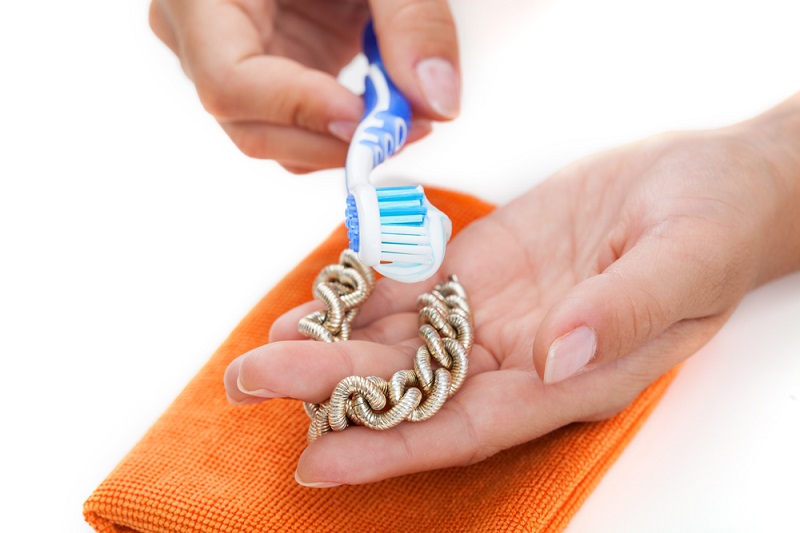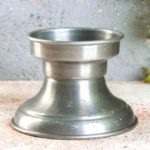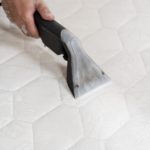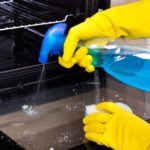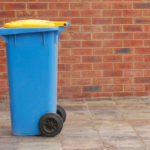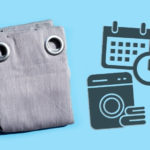From the delicate glimmer of a diamond necklace to the captivating allure of a vintage brooch, every treasure in your jewellery collection needs your utmost care to preserve its timeless beauty.
Over time, your precious pieces, heirlooms even, get caked in grime in the form of body fluids, lotions, makeup, mud and oils.
Jewellery can eventually become dull and tarnished, leaving it looking and hoping for some sort of revival at the bottom of a box!
So, how exactly do you go about cleaning jewellery so that it can have a new lease of life? Keep on reading to find out how to maintain and clean your jewellery.
Things to Know Before Cleaning Jewellery
- Don’t use harsh chemical cleaners – gentle (pH neutral/baby soaps) or specialised cleaners are the only products you should use to clean jewellery.
- Don’t oversaturate your items in water.
- Be careful, and don’t rub your items too hard because you could damage/warp the surface or remove any plating. For example, earrings can break or bend out of shape very easily!
- You don’t need to use gallons of cleaning solution to clean an item.
- Use softer tools, like soft bristled brushes, cotton buds, and microfibre cloths, to clean your pieces.
- If you’re given a ‘care book’ by the salesperson, read through it and stick to the cleaning advice you’re given by the manufacturer (it’s kind of like a user manual).
- Get to know what material you’ll be cleaning first and foremost! Then start cleaning.
- If you’re worried about cleaning delicate gemstones at home, just take them to a professional cleaner (opals, turquoise, pearls, and other soft gems, for example).
- If you’re given the option to buy a cleaning kit when you purchase your jewellery, consider getting it, as it may make the cleaning process a little easier for you.
- Test your chosen cleaning solution on a discreet patch of jewellery before you use it to clean an entire piece.
Note: You try the methods below at your own risk.
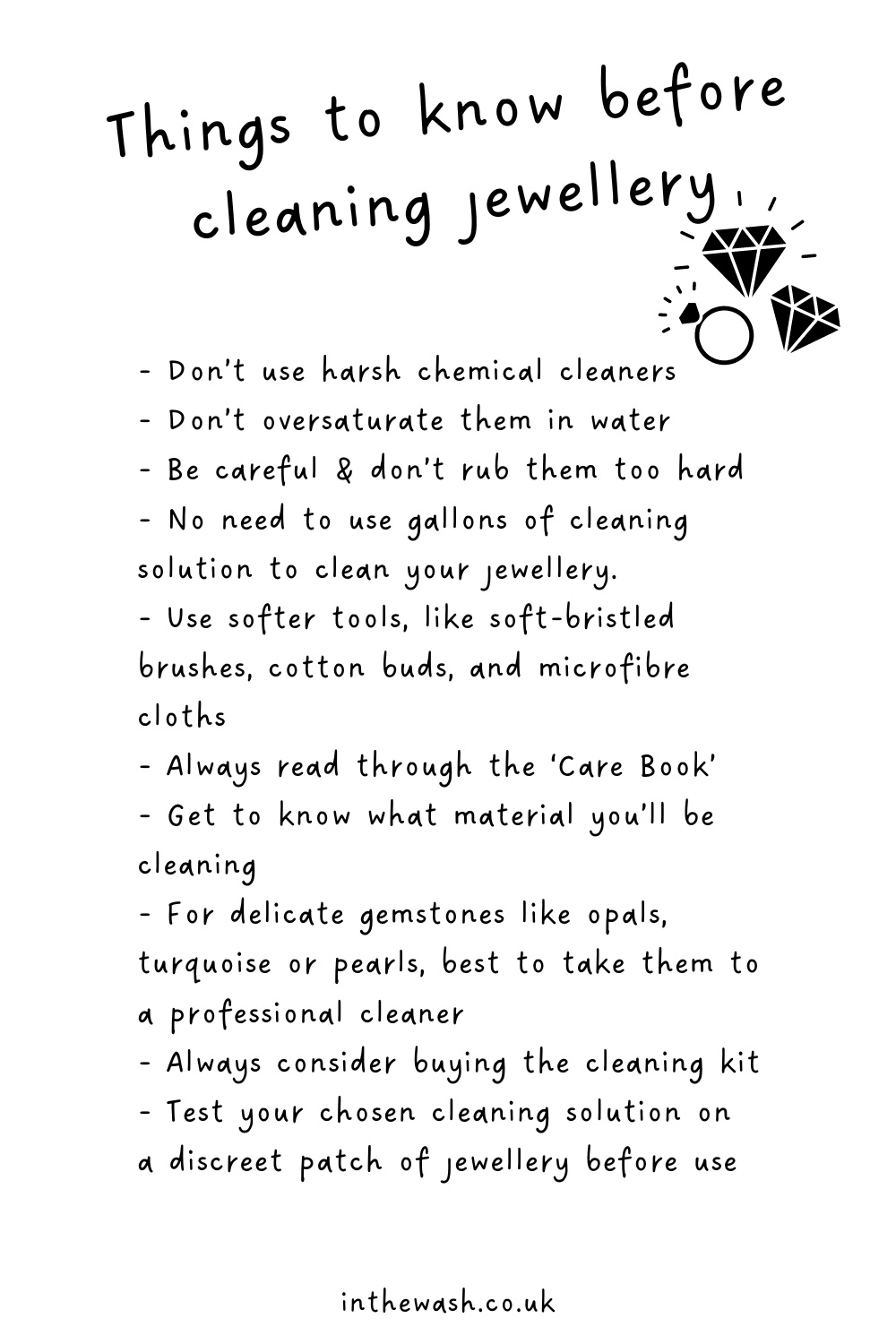
How to Clean Silver Jewellery
Below you’ll find a few different options you can utilise to clean your silver jewellery! In some cases, particularly if you’ve got extra dirty items, you might have to repeat a treatment twice.
Option 1: Warm soapy water
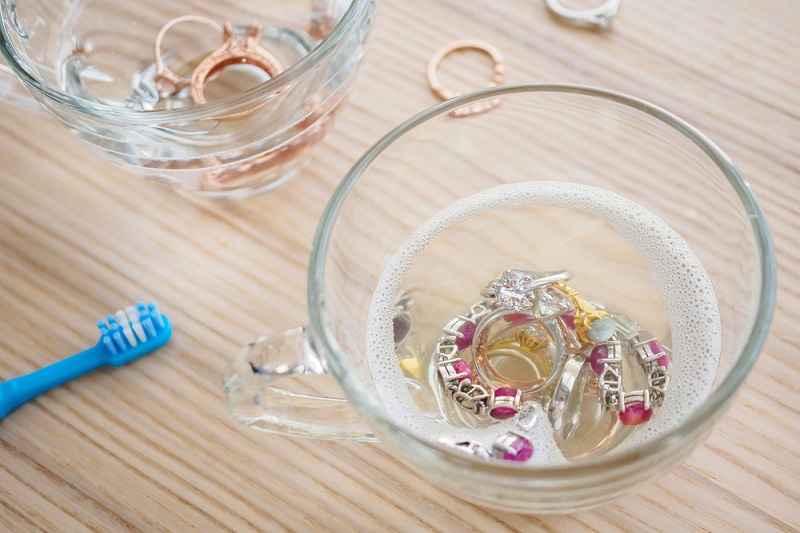
One of the simplest ways to clean silver jewellery is to wash it with warm water and soap.
Simply fill a shallow bowl with warm water and add a few drops of washing-up liquid to it.
Then dip a microfibre/soft cloth into the water, wring out the cloth, and start to rub the silver surface. Continuously soak the cloth and rub the silver until it becomes clean.
When you’re done, dry your items with a soft cloth and use another cloth to buff the surface to give it a shine.
Option 2: Bicarbonate of soda
Note: This may be difficult to carry out on small pieces of jewellery, like stud earrings!
In a bowl, mix three parts of bicarbonate of soda with one part of water to create a paste. When your paste is ready, pop it to one side while you soak each silver item in warm water.
Once every item has been soaked, you can spread the paste over them. Work the paste into all the crevices.
Continuously rub each silver item with a soft cloth to remove the grime from them. And when you’re done, rinse the paste off using warm water, dry the items and buff them with a cloth.
Note: Excessive use of bicarbonate of soda may scratch or damage your silver pieces, so use with caution and infrequently.
Option 3: Toothpaste
To use toothpaste to clean your silver, just coat your silver items in an even layer of white toothpaste (no gel), and rub the paste into all the nooks and crannies.
When you’ve covered every item in toothpaste, you can begin the rinsing process.
Just rinse each item clean with warm water. Remember to dislodge any toothpaste that might be stuck in the tiny gaps on your jewellery (use a cotton bud). Then dry and buff each piece to a shine.
Note: Excessive use of toothpaste may result in some minor scratches or damage to your silver items, so use it with caution and infrequently.
Option 4: Dip your silver items in a specialised solution
Goddard’s Silver Dip is just one of many specialised products designed to remove the tarnish from silver items and give them a glowing appearance!
Goddard’s Silver Dip is easy to use (you just dip your items into the bottle, then rinse and buff the silver dry), and provides long-lasting protection and shine to your silver items. It can also be used on other silver objects in a home as a bonus!
In addition to the above, you could also look into Hagerty Silver Clean Jewellery Immersion Bath. This product works like the dip above in the sense that you dip your silver jewellery into the solution for a set amount of time, and allow it to tear through the obvious oxidation and grime on your silver.
It can also protect your silver items for longer and leaves your pieces with a slightly floral fragrance!
Option 5: Cloth
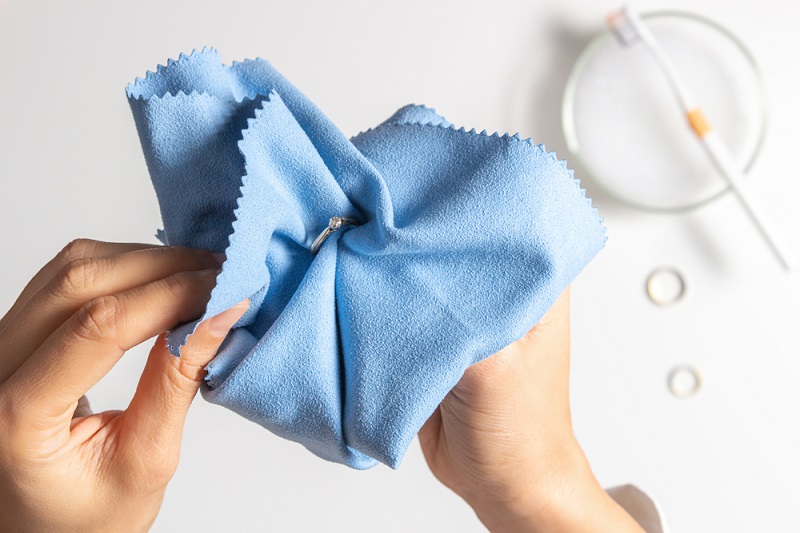
If you’re looking for a quick solution, or perhaps you just want to re-shine your silver at speed, you could rub them with a silver cleaning cloth.
Goddard’s Long Term Silver Polish Cloth has been designed to make your polishing job super easy and for you to see the results of your work in mere minutes.
All you need to do is rub the entire silver surface with the cloth, which is coated in silver polish, and your item will not only look noticeably cleaner and less tarnished, but will be far shinier!
Option 6: A salty-bicarb bath
For heavily tarnished silver jewellery, follow the steps below:
Grab a deep glass bowl and cover its bottom (inside) with aluminium foil.
Pop a cup of hot water, one tablespoon of salt, one tablespoon of bicarbonate of soda, and one tablespoon of gentle detergent (fragrance-free) into the bowl as well.
Once all your products are mixed together in the bowl, you can pop a few silver items into it, like some rings, earrings and a necklace.
If you have bigger silver pieces to clean, like chunky necklaces and bracelets, stick them inside the bowl one item at a time.
Leave the bowl and its contents alone for ten minutes. Remove the items after the timer has gone off and rinse them clean under the warm water tap. Pat each item dry and buff them with a fresh soft cloth.
Note: This method is unsuitable for jewellery made from/containing porous materials like pearl and turquoise.
How to Clean Gold Jewellery
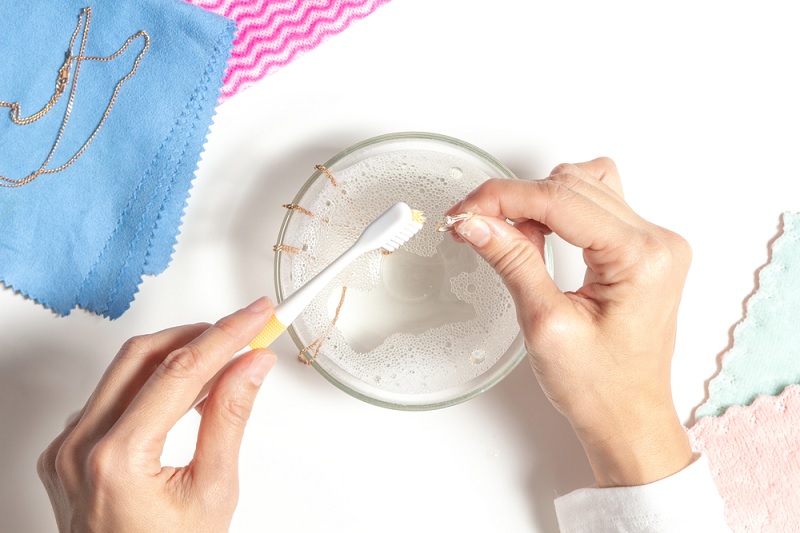
To clean gold jewellery, fill a bowl with a cup or two of fresh warm water and add a drop or two of washing-up liquid to it.
Then pop your gold item(s) into the water and allow them to soak for five minutes.
When the five-minute timer rings out, gently brush your gold piece(s) with a soft toothbrush or cloth.
When you’ve finished cleaning the gold item(s) in the bowl, remove one item at a time from the bowl, and lay it flat on a fresh soft cloth.
You can start brushing the item again (repeat for the other items). Once you’ve completed this step, you can rinse, dry and buff the golden surfaces.
Tip: For gold items that are adorned with hard-wearing gemstones like diamonds, rubies, emeralds and sapphires, you can swap the warm water for sparkling water as this can help to break down the dirt a little better in some cases.
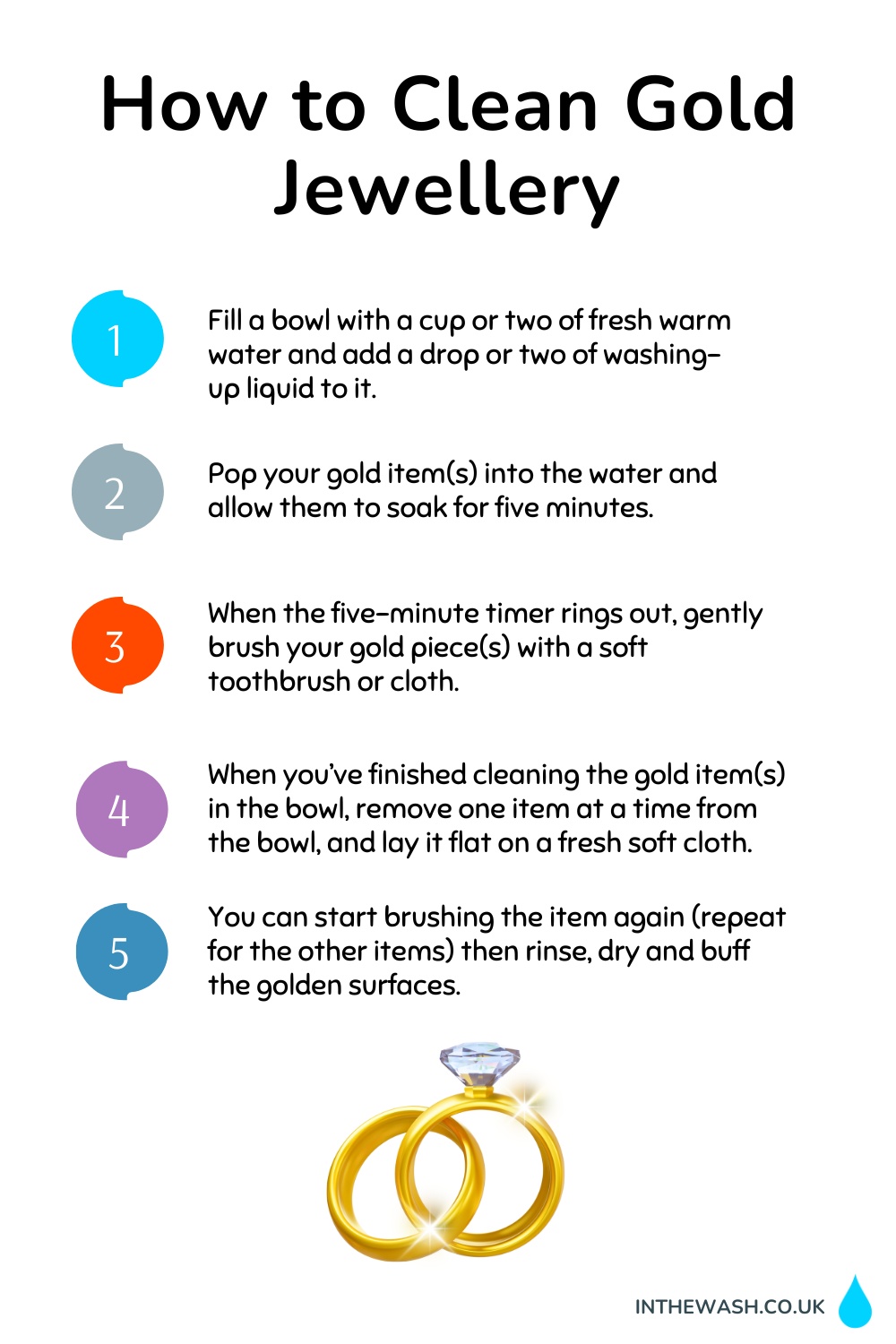
How to Clean Costume Jewellery
Costume jewellery is usually made from materials like brass, copper and aluminium. Therefore, it tarnishes very quickly and can get very dirty!
The key points to remember when handling and wearing costume jewellery are:
- Keep these items away from water – shower/bath/pool/sea.
- Don’t allow these pieces to sit in direct sunlight.
- Don’t coat these items in perfume.
- Don’t put lotions and creams on these pieces.
- Don’t soak costume jewellery in boiling water, as this will weaken the glue holding the pieces/fake diamonds in place. (The diamonds are not set properly, for example).
To clean costume jewellery, just use some water and washing-up liquid and a microfibre cloth. There’s no need to use fancy products. Just stick to the basics.
Mix some water and washing-up liquid in a bowl, dip the cloth in the water, and wring it out so it’s slightly damp.
Rub each piece of costume jewellery with the damp cloth (continuously re-soak and wring out the cloth during this time – you don’t want to put the grime back onto the jewellery).
When each item has been cleaned, you can use a fresh, damp cloth to remove the suds/residue off the surfaces. Place each item on a soft, flat surface and pat every piece dry.
If any item has a crevice, dry it out using a cotton bud and place it upside down on a soft surface so that any liquid inside can run out.
How to Clean Jewellery with Pearls
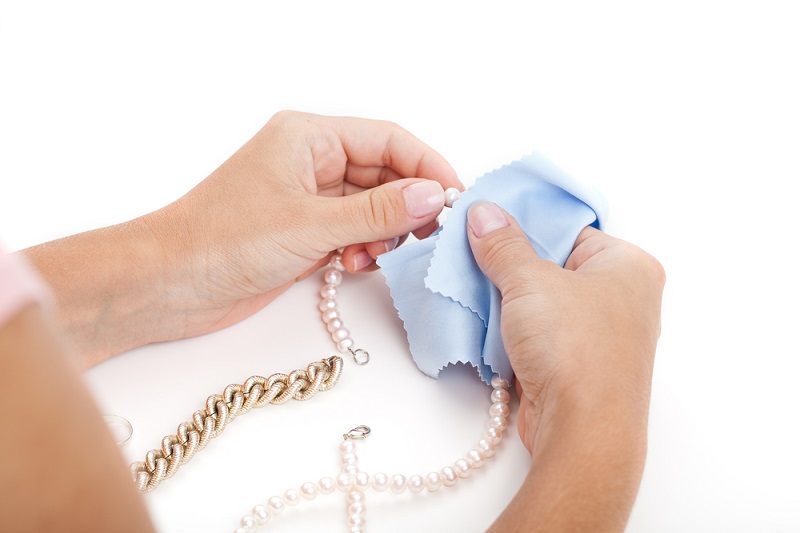
Pearls are porous, which means they absorb almost all liquids, sprays and lotions, which is why they need to be cared for in a particular way.
Don’t soak pearls and other delicate gemstones like turquoise in water for prolonged periods, as this can weaken them.
Option 1: A pearl cleaning kit
Get a pearl cleaning kit like this one from Town Talk on Amazon and use it to maintain your pearly items.
In a kit, you’ll typically get some polishing cloths that are designed to keep pearls clean. And to use them, you just carefully rub the cloth along the pearly surface.
Option 2: Mild shampoo
If you’re very careful, you can clean your pearls using some delicate shampoo and very little water.
In a shallow bowl, mix a cup of warm water with a drop or two of mild shampoo (baby shampoo).
Dip a very soft, clean makeup brush into the water, tap it on the side of the bowl to remove excess water from it, and start brushing your pearls.
Don’t add too much pressure to the pearls as you brush them, and make sure you don’t saturate them in liquid!
When you’re done, use a very soft cloth to pat excess moisture from the pearly surface, and then leave them to air dry on a flat surface.
Option 3: Ask a pro for help
When it comes to pearls, there are some ways you can maintain and clean them at home, but from time to time, it’s worth taking these delicate pieces to an actual jewellery cleaner to get them checked out and cleaned.
A professional jewellery cleaner will have access to different tools and specialised cleaning solutions, so they’ll be able to handle your precious pieces for you.
How to Clean Silk Jewellery
Silk necklaces and bracelets can be hand washed with warm, slightly soapy water and a soft cloth.
Just rinse any suds off your piece when you’re done, and then leave your item to dry on a flat surface.
Just make sure that you don’t oversaturate your silk piece in water.
Ultrasonic Cleaning
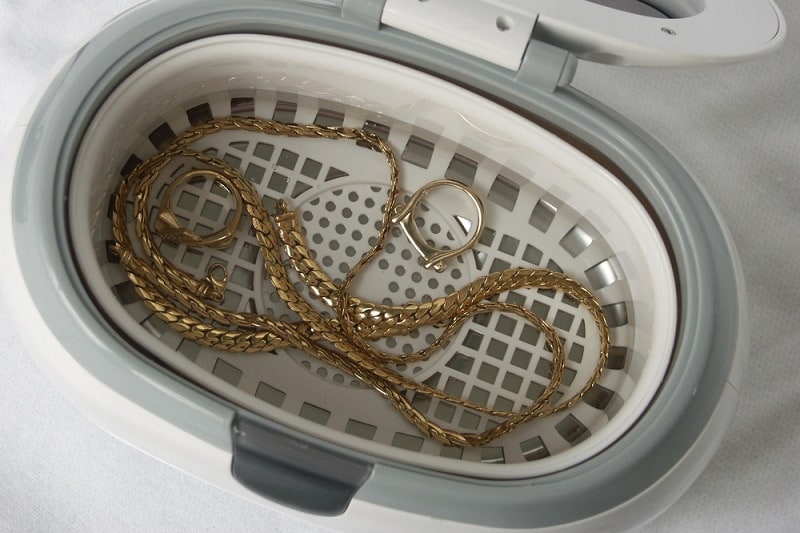
It’s also possible to clean jewellery using an ultrasonic cleaning bath like this one from VLOXO.
You pop an item or two (depending on size) inside a bath-shaped bowl, and tiny waves inside the bath create high-pressure bubbles that dislodge general grime from the surface of the jewellery.
It’s a pretty handy tool as it can get to work in a few minutes and generally yields positive results. It can also be used to clean other objects in a home aside from jewellery!
It isn’t, however, suitable for jewellery that contains/is made up of pearls, turquoise and opals. The bubbles can weaken the material and sometimes cause fading or darkening.
Diamond Dazzle Sticks
If you need an on-the-go type of cleaner to keep your diamonds dazzling, then check out Connoisseur’s Jewellery Cleaning Diamond Dazzle Stik. This handy travel-sized stick can help to reduce the look of scratches, bring a sparkle back to dulling diamonds, and can take out general dirt and grime from surfaces.
It’s incredibly easy to use. You remove the cap, twist the stick, and brush your diamonds! It’s the ideal companion to keep on you when you’re out and about, and your jewels need a little TLC!
Professional Jewellery Cleaning
If you don’t fancy trying the options above, or maybe you have a priceless item that you just don’t want to damage, you could take your piece(s) to a jewellery cleaner to get them professionally cleaned and repaired if need be.
To find a specialist in this field, you can do an online search, or ask jewellers near your home for advice.
Whatever option you choose, make sure you do your homework beforehand and ask lots of questions!
The last thing you want is for a precious piece of jewellery to end up looking worse for wear or, in some cases, to be unwearable!
For more information on how to care for a particular gemstone that hasn’t been mentioned above, see the Gemstone Care Guide from the IGS.
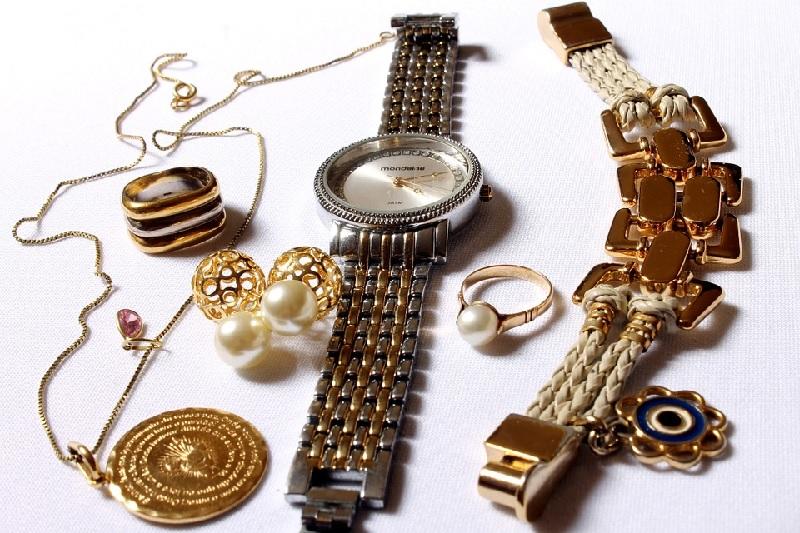
How to Keep Jewellery Clean
Follow the steps below to keep your jewellery sparkling in between deep cleans:
- Make sure your jewellery is stored correctly. Pop them in a suitable jewellery box.
- Don’t keep your pieces in humid environments, especially silver pieces, as this encourages tarnishing.
- Regularly clean your jewellery because this is the only way to stop a build-up of dirt from forming on the surface.
- Take your rings, and perhaps bracelets, off when cleaning your hands.
- Remove all your jewellery when showering because shampoo, soap and conditioner will clog up inside the tiny crevices and make your items look dull. Plus, you don’t want to lose any stones down the plug hole!
- If need be, ask an expert jewellery cleaner to take care of your items.
- Don’t wear rings when you’re putting your makeup or lotion on. Product residue will build up on the items’ surfaces, making the pieces dull and gunk-ridden. It won’t look very nice.
- Remove your jewellery before you go swimming because chlorine, and salt in the sea, can have an adverse effect on the material.
- Give your pearls a gentle wipe with a soft cloth when you take them off, so you can remove bodily oils from their surface.
- Alternate between your jewellery pieces so you don’t over-wear one piece.
- Don’t allow your jewellery to rub against each other because this causes scratches.
- Make use of anti-tarnish bags if you’ve got silver pieces.
- If you like leaving your jewellery on display, you’ll have to clean them more often as dust will build up on them.

Bethan has a passion for exploring, reading, cooking and gardening! When she’s not creating culinary delights for her family, she’s concocting potions to keep her house clean!
